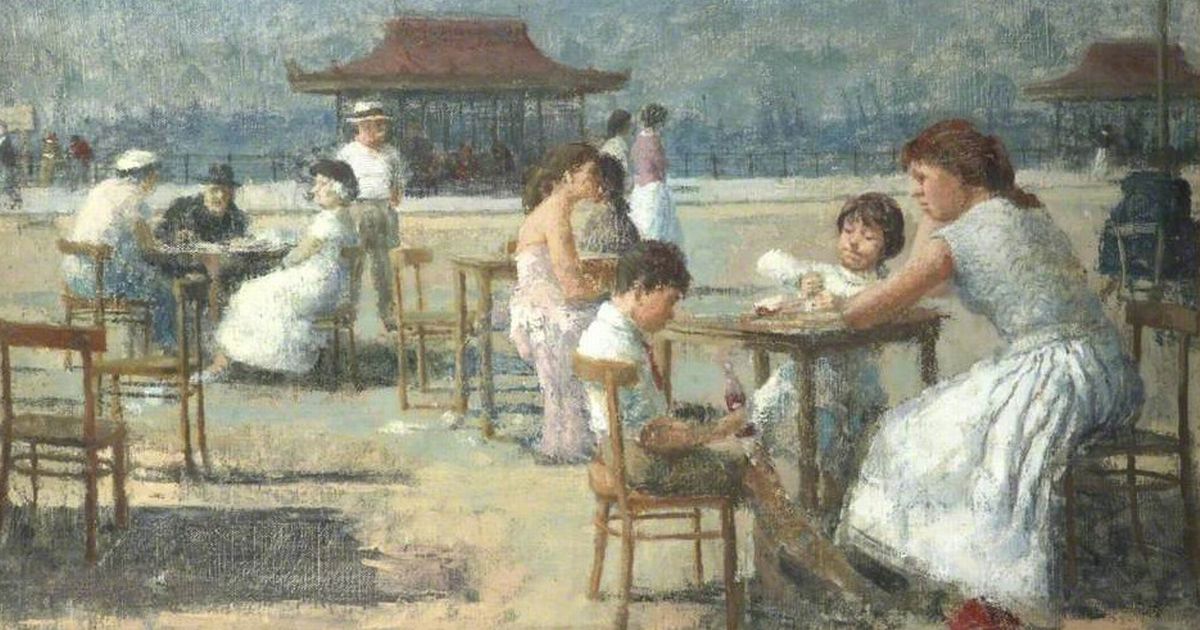Geoff Yeomans’ Café Scene was preserved in the storage area of the Walker Art Gallery – 75 years after it was purchased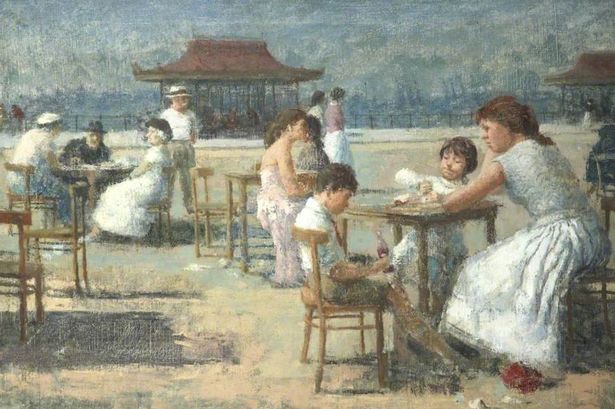 Café Scene by Geoff Yeomans(Image: Geoff Yeomans)
Café Scene by Geoff Yeomans(Image: Geoff Yeomans)
An impressionist painting of a fine summer’s day on New Brighton beach was feared lost – before being rediscovered at Liverpool’s Walker Art Gallery 75 years after it was purchased. Café Scene, by Birkenhead artist Geoff Yeomans, was bought by the art gallery in the 1950s, but has remained hidden in the museum’s storage in recent years.
It was rediscovered last year by Geoff’s son Jason, as he aimed to track down his father’s artistic legacy. Jason said: “He had a whole series of pictures in the 1950s from when he was an art student in Liverpool, and they’re impressionistic scenes of Merseyside. Some are in the Williamson gallery in Birkenhead. There’s a beautiful one in Runcorn town hall which is called the Three Bridges, which I’ve seen a couple of times
“I have some of his early works because I inherited them. Last year I got in touch with the curator of the Walker Art Gallery and we went down to see this Café Scene.”
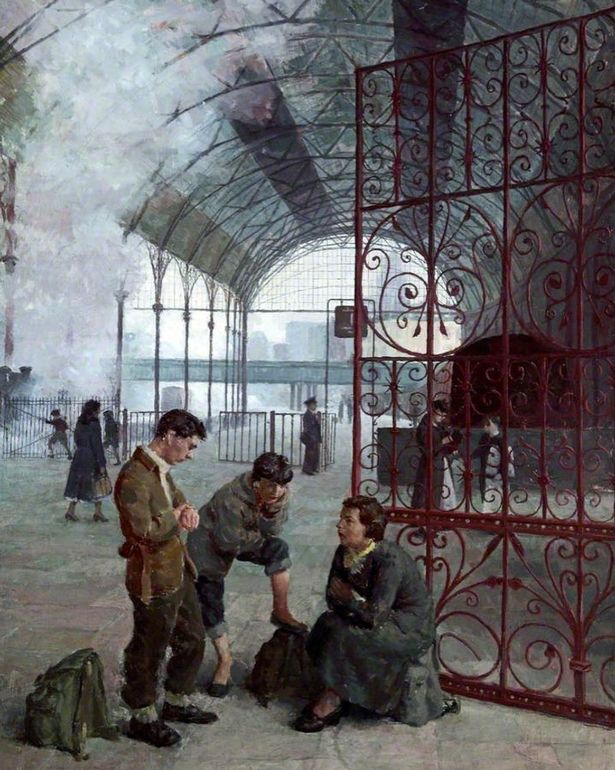 Woodside Station by Geoff Yeomans, at the Williamson gallery in Birkenhead(Image: Geoff Yeomans)
Woodside Station by Geoff Yeomans, at the Williamson gallery in Birkenhead(Image: Geoff Yeomans)
Geoff Yeomans grew up in Birkenhead and attended the Liverpool College of Art, where John Lennon famously met his first wife Cynthia Powell and friend Stuart Sutcliffe, the original bass guitarist of the Beatles. He also studied at the Laird School of Art in his home town.
Later in life, he moved to Warwickshire and became the deputy head of an art school in Nuneaton. The grandad-of-one died in 2021 at the age of 84, but his artwork lives on at the Williamson Art Gallery and Museum in Birkenhead, and at Runcorn Town Hall, where his paintings were displayed.
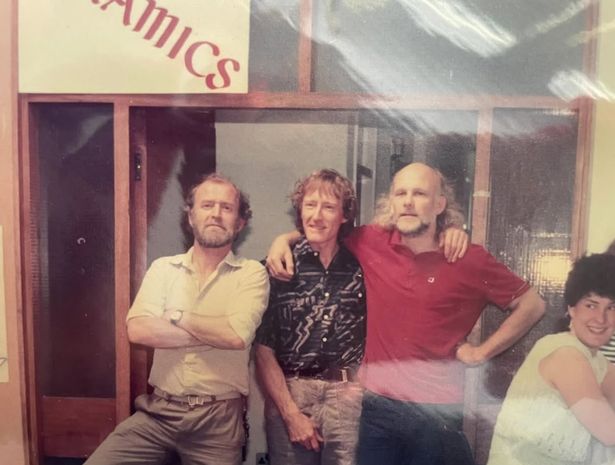 Geoff Yeomans, left, in his teaching days at Nuneaton(Image: Jason Yeomans)
Geoff Yeomans, left, in his teaching days at Nuneaton(Image: Jason Yeomans)
Jason said: “His parents wanted him to be an electrician but his love was art. I don’t know what sparked that passion, but he ended up going to Liverpool Art College and he was invited to the Royal Academy. But he had national service so he had to join the air force, so he missed that opportunity.
“He went through different periods of work. In the last few years of his life he ended up painting shipwrecks in Wales. He painted the U-boat that was positioned on the side of the River Mersey in Liverpool. He was obsessed with ageing and the beauty of decay in the last few years of his life.
“He always painted, even when he was working as an art teacher. He was always in the studio. Technically he was incredibly gifted.
“I had never scene the Café Scene in real life, but I’d seen images of it and I knew that the Walker Art Gallery had it, and I wondered why it was never up. So it was quite an emotional day going to see that, because I’d never seen it before.
“They’re like children in a way, meeting things he’s created that I’d never seen before.
“He was a kind guy with a huge passion for art, and he passed that down to me. When I went to visit him sometimes I’d see photographs of paintings that I’d never seen before they were sold, and those are gone. It’s almost impossible to find them all because some are lost. We don’t know where they are now, so it’s impossible to keep track of them all.”
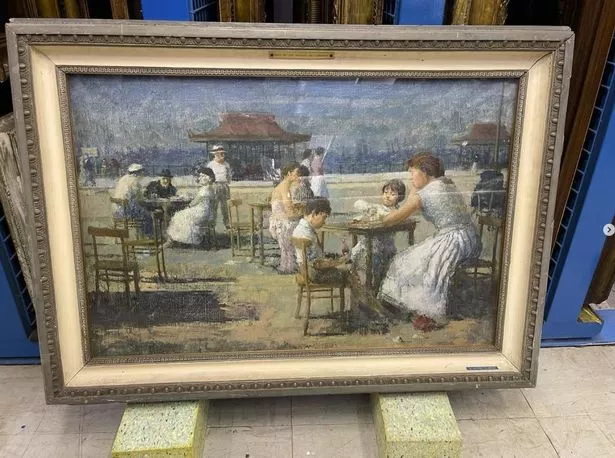 The Café Scene in the Walker Art Gallery storage(Image: Jason Yeomans)
The Café Scene in the Walker Art Gallery storage(Image: Jason Yeomans)
A spokesman for National Museums Liverpool, which runs the Walker Art Gallery, said: “Café Scene has been displayed multiple times since its acquisition, including when Geoff participated in our ‘artist at work’ series at the Walker in the late 1990s. We hosted him as he took up residency in the gallery to work across two weekends in October 1999.
“While the painting hasn’t been on display in recent years, this is not unusual for works in our collection, and it is currently under consideration for display opportunities in the next two years.
“National Museums Liverpool cannot display its entire collection due to space limitations, conservation needs, and ongoing reassessment of how certain objects are displayed. Works in storage remain important records of artistic achievement and cultural history, carefully preserved, and remain available for research and special access requests.
“Looking ahead to our 150th anniversary in 2027, we’re undertaking gallery refurbishments and rehangs, particularly of our Post-War and Contemporary collections.
“We’re also committed to expanding our digital access programme to make more of our collection available online, which would allow a global audience to view and learn about works not currently on display.”
Jason still hopes his dad’s work will find its way into a Walker Art Gallery exhibition in the future.
He said: “There’s a huge amount of work in the Walker gallery and they only have a specific amount of wall space. They have Lucian Freud and other artists, and he’s simply not high up on the list.
“People come and go, curators come and go, curators that never heard of him. If I can keep the painting in mind, one day it might go up.”

